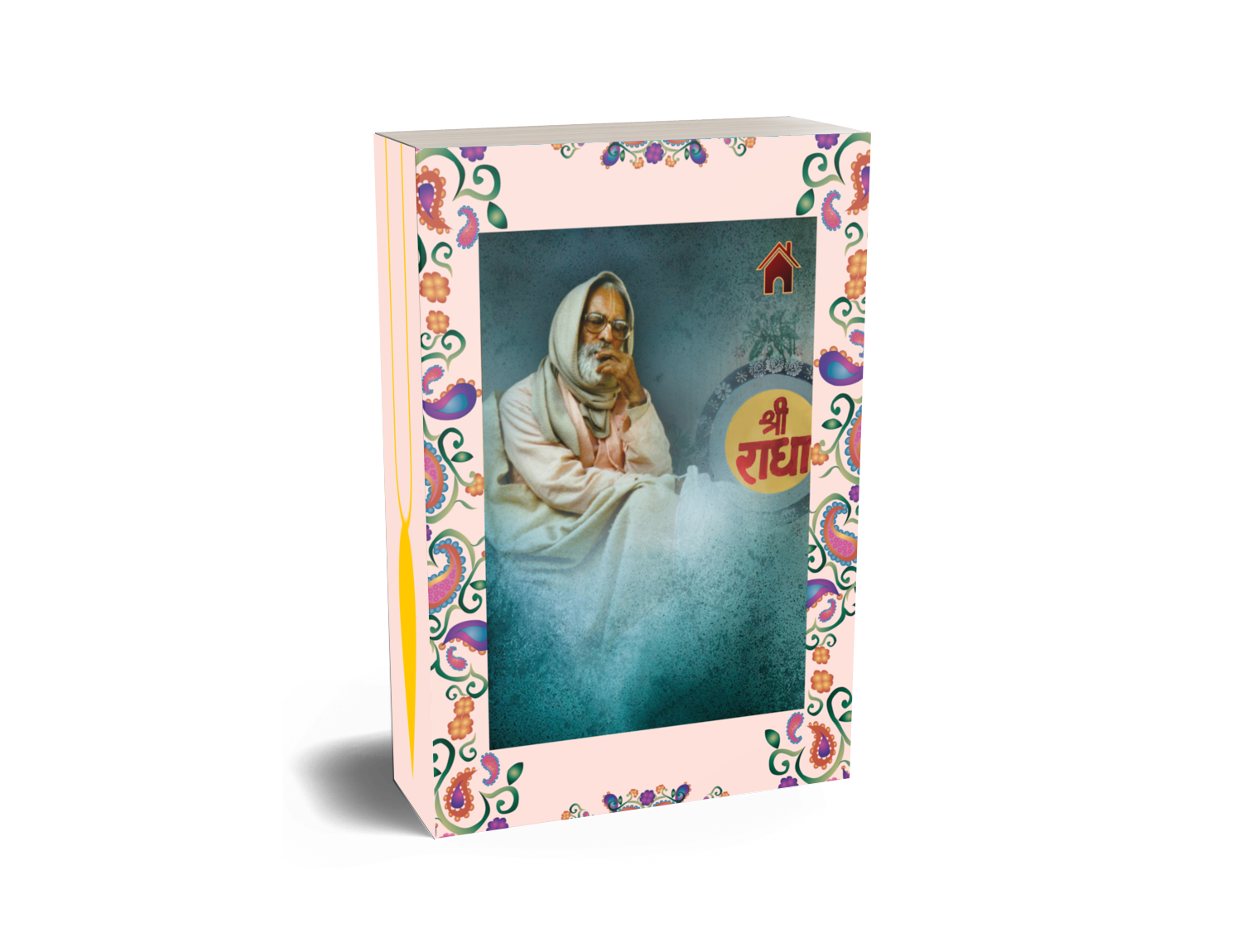

Chapter Eight from the book, Bhakti-rasāyana, 4th edition by Śrīla Bhaktivedānta Nārāyaṇa Mahārāja
During the daytime, the gopīs are sitting together in their homes and reveal their inner sentiments to one another. 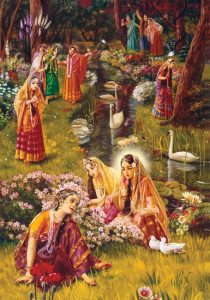 One says, “After leaving this body, I desire to take birth as a deer, and then easily I will receive the darśana of Kṛṣṇa.” Another says, “I desire to become a cow or a calf. Who stops them from approaching Kṛṣṇa? Hearing the vibration of Kṛṣṇa’s flute, I will approach Him and become spellbound, just as the cows and calves do. In an unrestricted fashion I will receive His darśana.” In this way some gopīs desire to become clouds, and others desire to become bees, birds or rivers. Now, in this verse from the end of the Veṇu-gīta, they will begin to speak about those in human form:
One says, “After leaving this body, I desire to take birth as a deer, and then easily I will receive the darśana of Kṛṣṇa.” Another says, “I desire to become a cow or a calf. Who stops them from approaching Kṛṣṇa? Hearing the vibration of Kṛṣṇa’s flute, I will approach Him and become spellbound, just as the cows and calves do. In an unrestricted fashion I will receive His darśana.” In this way some gopīs desire to become clouds, and others desire to become bees, birds or rivers. Now, in this verse from the end of the Veṇu-gīta, they will begin to speak about those in human form:
pūrṇāḥ pulindya urugāya-padābja-rāga
śrī-kuṅkumena dayitā-stana-maṇḍitena
tad-darśana-smara-rujas tṛṇa-rūṣitena
limpantya ānana-kuceṣu jahus tad-ādhim
Śrīmad-Bhāgavatam (10.21.17); Bṛhad-bhāgavatāmṛta (2.7.119)
O sakhī, we consider the Pulinda girls who collect grass and wood to be greatly fortunate, because by spreading the kuṅkuma which lies upon the grass on their faces and bodies, the desires which arise in their hearts from seeing that very kuṅkuma are pacified. In reality, that kuṅkuma is from the breasts of Śrīmatī Rādhikā, and at the time of enjoying pastimes with Śrī Kṛṣṇa, it becomes smeared on His lotus feet. Then as They wander in the forest, it falls from His feet onto the grass.
In previous times in Vraja there was a tribe called Pulinda, who would construct small huts that they would live in  for only a short time and then move on. Their women would collect wood or dry plants and sell them to maintain themselves, or they would bring water for people. They were also artists, so they would travel to peoples’ homes selling their craftwork. The gopīs are saying, “Aho! All of the living entities we have described so far are certainly fortunate, but this girl of the Pulinda tribe is pūrṇāḥ – completely fortunate. Why? In the morning, arriving in the valleys of Govardhana to collect wood, she notices that kuṅkuma is mixed with the dew on the grass. Seeing this, desire begins to burn in her heart.”
for only a short time and then move on. Their women would collect wood or dry plants and sell them to maintain themselves, or they would bring water for people. They were also artists, so they would travel to peoples’ homes selling their craftwork. The gopīs are saying, “Aho! All of the living entities we have described so far are certainly fortunate, but this girl of the Pulinda tribe is pūrṇāḥ – completely fortunate. Why? In the morning, arriving in the valleys of Govardhana to collect wood, she notices that kuṅkuma is mixed with the dew on the grass. Seeing this, desire begins to burn in her heart.”
Intense eagerness to meet Kṛṣṇa arose in her heart because the remembrance of a previous incident came to her. The day before, in a kuñja of Govardhana, Kṛṣṇa and His friends were playing dice with the gopīs. There were two parties: Kṛṣṇa’s party and Śrīmatī Rādhikā’s party, and the main players were Kṛṣṇa and Śrīmatī. Subala and Madhumaṅgala and others were on Kṛṣṇa’s side, and Lalitā, Viśākhā and the other sakhīs were on Rādhikā’s side. Kṛṣṇa put up something as a bet and was defeated. Then Rādhikā said, “What will You bet now? You should stake Your flute.”
Kṛṣṇa replied, “I will stake My flute, but what will You put up? You should stake an equally valuable thing. I value My flute like My very life, but I will stake it if You stake something of equal value.”
Rādhikā said, “Then You please say what I should stake.”
Kṛṣṇa said, “All right – You should stake one of the friends of Your sakhīs.”
Being very pleased, Rādhikā agreed to this and whispered to one of Her sakhīs, “In the village nearby is a girl of the Pulinda tribe. Go and call her.” They brought the girl there, and entering that assembly the poor girl felt very shy. She felt ashamed because she was of a lower class, so reluctantly she sat in the back. Seeing her, Kṛṣṇa said, “I will not stake My flute for her! What is the meaning of this?” Then all of the gopīs began laughing and clapping. At that time, this Pulinda girl saw the beauty of Kṛṣṇa. Before it was described how all of the birds and animals became spellbound by seeing Kṛṣṇa, but this girl considered herself a maidservant of Rādhikā, so upon seeing Kṛṣṇa she became even more spellbound.
the Pulinda tribe. Go and call her.” They brought the girl there, and entering that assembly the poor girl felt very shy. She felt ashamed because she was of a lower class, so reluctantly she sat in the back. Seeing her, Kṛṣṇa said, “I will not stake My flute for her! What is the meaning of this?” Then all of the gopīs began laughing and clapping. At that time, this Pulinda girl saw the beauty of Kṛṣṇa. Before it was described how all of the birds and animals became spellbound by seeing Kṛṣṇa, but this girl considered herself a maidservant of Rādhikā, so upon seeing Kṛṣṇa she became even more spellbound.
So the next morning while this aborigine girl was collecting wood and plants, she saw kuṅkuma lying on the grass, and automatically she knew where it had come from – the breasts of Rādhā. Are the birds, deer or aborigines of Vṛndāvana ordinary? For instance, how do they know Kṛṣṇa is coming in their direction when He is taking the cows out for grazing? They all recognise His intoxicating fragrance. It is expected that the gopīs would naturally recognise this fragrance, but even the birds and animals are familiar with it. When the Pulinda girl saw 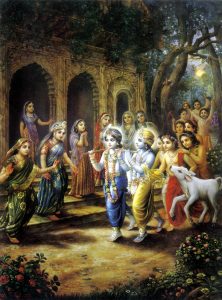 this kuṅkuma, such an intense desire to meet Kṛṣṇa arose in her heart that she was unable to restrain it.
this kuṅkuma, such an intense desire to meet Kṛṣṇa arose in her heart that she was unable to restrain it.
When Kṛṣṇa is departing Nanda-bhavana to take the cows out to graze in the forest for the day, all of the men, women and children of Vraja assemble along the road to catch a glimpse of Him. They are all standing along the path, and Kṛṣṇa is coming on His way playing the flute. At that time there are also some young girls who come to see Him who are in śānta-rati. There are many types of śānta-rati, such as samanya (general) and svaccha (undeveloped). The aborigine girl was svaccha, which means that rati had arisen inside her, but not sthāyi-rati, her permanent internal sentiment. After a seed is planted, a creeper begins to grow from it. At that time its leaves have begun to appear but have not completely developed, and from looking at the leaves you cannot ascertain what kind of plant it is. But when the leaves become full, then you can tell what kind of plant it is. It is the same with rati, and the Pulinda girl’s rati is described as being svaccha. Whenever she sees Kṛṣṇa reciprocating with His devotees in a particular mellow, she desires to share that same mellow with Him.
For instance, when she sees Mother Yaśodā nurturing Kṛṣṇa, reciting mantras so that no harm will come to Him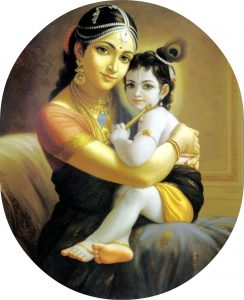 and wiping His face with the end of her sārī, she becomes spellbound. Without blinking she just gazes at Him, thinking, “I would like to be His mother just like her.” This is svaccha-rati. Then a little later she sees Kṛṣṇa playing His flute, and running, playing and eating with His friends with great pleasure, and then she again becomes spellbound, thinking, “I would like to become a sakhā so I can run and play with Him like this.” Then later she sees Kṛṣṇa standing in His threefold-bending posture, playing the flute and gazing at the gopīs. He is shivering, His crown is tilting to one side and His yellow shawl is slipping down. Seeing this, she thinks, “I would like to become a friend of Rādhā and serve Him with a similar sentiment.” This is called svaccha-rati.
and wiping His face with the end of her sārī, she becomes spellbound. Without blinking she just gazes at Him, thinking, “I would like to be His mother just like her.” This is svaccha-rati. Then a little later she sees Kṛṣṇa playing His flute, and running, playing and eating with His friends with great pleasure, and then she again becomes spellbound, thinking, “I would like to become a sakhā so I can run and play with Him like this.” Then later she sees Kṛṣṇa standing in His threefold-bending posture, playing the flute and gazing at the gopīs. He is shivering, His crown is tilting to one side and His yellow shawl is slipping down. Seeing this, she thinks, “I would like to become a friend of Rādhā and serve Him with a similar sentiment.” This is called svaccha-rati.
So this Pulinda girl, in comparison to the creepers, bees, clouds and deer, is the best of all. As a result of witnessing Kṛṣṇa performing His pastimes, and especially from seeing Kṛṣṇa just the day before, she has gradually come to desire to enter the camp of Rādhā’s servitors to be able to serve Him as they do. Therefore when she saw the kuṅkuma on top of the grass, smara-rujaḥ – an intense desire to meet Kṛṣṇa arose in her. If eagerness to meet Kṛṣṇa arises even in the birds and animals, then it is even more natural that it would arise in her. If such eagerness develops within a sādhaka, then it can be said that he is really engaged in sādhana-bhajana. But presently we have no such eagerness to meet Him; instead we are greatly determined to obtain material enjoyment. As yet we have no real eagerness for bhakti, but we should endeavour to obtain this eagerness because it is the root, the very life of bhajana.
The Pulinda girl looked at the kuṅkuma and began analysing it: “Where has this kuṅkuma come from? Has it 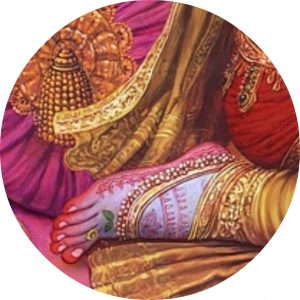 come from the feet of Kṛṣṇa, or the feet of the gopīs? Kuṅkuma is not applied to Kṛṣṇa; only the gopīs apply kuṅkuma to their bodies, so how could it have turned up here? This is difficult to understand. Somehow I know that it could have only come from Kṛṣṇa’s feet, but how did it get on Kṛṣṇa’s feet? Oh, I understand! Fearing that Kṛṣṇa’s feet would be harmed by pebbles and thorns as He roams about, the gopīs sometimes place His feet on their breasts. Therefore this kuṅkuma must have come from Kṛṣṇa’s feet as He returned home from His rendezvous with the gopīs.” Understanding the situation, she at once became intoxicated, placed some of this kuṅkuma on her head, and by spreading it all over her whole body, her kāma was pacified.
come from the feet of Kṛṣṇa, or the feet of the gopīs? Kuṅkuma is not applied to Kṛṣṇa; only the gopīs apply kuṅkuma to their bodies, so how could it have turned up here? This is difficult to understand. Somehow I know that it could have only come from Kṛṣṇa’s feet, but how did it get on Kṛṣṇa’s feet? Oh, I understand! Fearing that Kṛṣṇa’s feet would be harmed by pebbles and thorns as He roams about, the gopīs sometimes place His feet on their breasts. Therefore this kuṅkuma must have come from Kṛṣṇa’s feet as He returned home from His rendezvous with the gopīs.” Understanding the situation, she at once became intoxicated, placed some of this kuṅkuma on her head, and by spreading it all over her whole body, her kāma was pacified.
The Bhāgavatam says that kāma, or lust, exists in the heart of the conditioned soul like a disease. This fire of lust burns inside the conditioned soul as he turns away from Bhagavān and casts his vision in the direction of māyā. The conditioned soul becomes attracted to the opposite sex, to wealth and to being praised by others. Some leave material life and take up residence in a temple to engage in bhajana, and even attain a little taste for chanting the holy name and hearing hari-kathā, then fall down and leave. Why? They were attracted to māyā, were they not? Certainly they were very attracted; if they had such a strong attraction for the Lord, they wouldn’t have entered the material world in the first place. The attraction of māyā is very, very strong, and in this connection there is the example of Kālā Kṛṣṇadāsa, a boy of sixteen or seventeen years. Nityānanda Prabhu, Rāya Rāmānanda and Svarūpa Dāmodara each said to Śrī Caitanya Mahāprabhu, “O Lord, please don’t go to South India alone. I will accompany You.”
Mahāprabhu replied, “If I take any of you, then the others will say, ‘You are taking him, but not me?’ Then I will be at fault, so I will go alone.”
“All right, then we will send someone whom You are not acquainted with: this simple and honest son of a brāhmaṇa. Keep him with You, because how Your mind changes we cannot understand. Sometimes You forget everything, even Your bodily needs. You require kaupīnas and a waterpot, so who will carry them? Sometimes You throw them somewhere and proceed onward, and sometimes when You are crying out, ‘Where is the Lord of My life?’ You roll on the ground, and even if Your clothes were to come off, You wouldn’t notice! Crying and crying, You just proceed onward. You will need someone to fetch water and beg alms for You, so please take this Kālā Kṛṣṇadāsa.” Mahāprabhu agreed, and Kālā Kṛṣṇadāsa accompanied Him until they reached Kanyākumārī, where there was a group of gipsies called Bhaṭṭathāris who would travel here and there with their bulls, donkeys 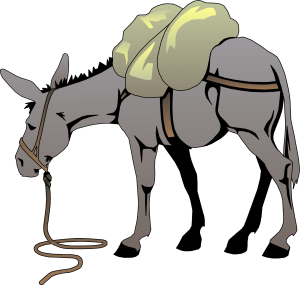 and belongings. Their business was to lure young boys and girls to join them – how? They would show boys a girl, and girls a boy. Once they had lured someone they would immediately move on, and the people of the village would not know where their son or daughter had gone. In this way they would set traps for innocent boys and girls, and there was a very large group of these gipsies nearby where Mahāprabhu was staying. One day Mahāprabhu went out begging, leaving Kālā Kṛṣṇadāsa sitting underneath a tree. One of these gipsies approached him, and after speaking with him for some time, said, “It is as if you have been my son for a very long time! Look – we will marry you to this girl, and you will live with her very happily. Within our tribe you will become a king.” The poor boy was lured, and decided to go with them.
and belongings. Their business was to lure young boys and girls to join them – how? They would show boys a girl, and girls a boy. Once they had lured someone they would immediately move on, and the people of the village would not know where their son or daughter had gone. In this way they would set traps for innocent boys and girls, and there was a very large group of these gipsies nearby where Mahāprabhu was staying. One day Mahāprabhu went out begging, leaving Kālā Kṛṣṇadāsa sitting underneath a tree. One of these gipsies approached him, and after speaking with him for some time, said, “It is as if you have been my son for a very long time! Look – we will marry you to this girl, and you will live with her very happily. Within our tribe you will become a king.” The poor boy was lured, and decided to go with them.
When Mahāprabhu returned and didn’t see him, He thought, “Where has that boy gone? Oh, those gipsies must have taken him!” Mahāprabhu entered their party, and locating Kālā Kṛṣṇadāsa, grabbed him by the śikhā, saying, “You rascal! You left Me and came here?” He had to forcibly drag back Kālā Kṛṣṇadāsa, who didn’t even desire to leave there! So just see how, even if one is associating with Bhagavān Himself, māyā can attract him. So what to speak of us? This māyā is very dangerous, and escaping its many trappings is very difficult. And even if someone can renounce everything – even his wife and family – still he may not be able to leave the desire for prestige (pratiṣṭhā). It is as if the desire for it runs in our veins. But if we receive some special mercy from the spiritual master, the Vaiṣṇavas and Bhagavān, then we will be able to abandon that desire; otherwise we won’t easily be able to leave it. We should make our own effort to leave it, but we must also receive their mercy.
vikrīḍitaṁ vraja-vadhūbhir idaṁ ca viṣṇoḥ
śraddhānvito ’nuśṛṇuyād atha varṇayed yaḥ
bhaktiṁ parāṁ bhagavati pratilabhya kāmaṁ
hṛd-rogam āśv apahinoty acireṇa dhīraḥ
Śrīmad-Bhāgavatam (10.33.39)
If one faithfully hears the five chapters of the Śrīmad-Bhāgavatam that describe the rāsa dance – Kṛṣṇa’s 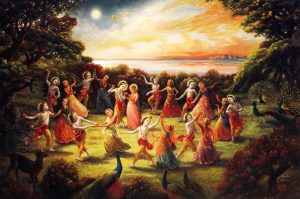 transcendental pastimes with the gopīs – then the heart disease of lust will be destroyed. But it must be heard with real faith, which is received from the spiritual master and the Vaiṣṇavas. If one enjoys reading novels, and considers these pastimes between Kṛṣṇa and the gopīs to be mere fiction, then it will not have the desired effect. Previously there was this lust in the Pulinda girl’s heart, but by the mercy of the great bhāva of the gopīs, who are Kṛṣṇa’s hlādinī-śakti, all anarthas can be destroyed. Therefore that kuṅkuma was the gopīs’ and having been smeared on Kṛṣṇa’s feet, it now lay on the grass invested with some powerful potency (śakti). Having come in contact with both the gopīs and Kṛṣṇa, it had become so powerful.
transcendental pastimes with the gopīs – then the heart disease of lust will be destroyed. But it must be heard with real faith, which is received from the spiritual master and the Vaiṣṇavas. If one enjoys reading novels, and considers these pastimes between Kṛṣṇa and the gopīs to be mere fiction, then it will not have the desired effect. Previously there was this lust in the Pulinda girl’s heart, but by the mercy of the great bhāva of the gopīs, who are Kṛṣṇa’s hlādinī-śakti, all anarthas can be destroyed. Therefore that kuṅkuma was the gopīs’ and having been smeared on Kṛṣṇa’s feet, it now lay on the grass invested with some powerful potency (śakti). Having come in contact with both the gopīs and Kṛṣṇa, it had become so powerful.
How much śakti can be in foot dust? Once Śrī Rāmacandra was walking along in a forest and he came across Gautama Ṛṣi, who had cursed his wife, Ahalyā, to become stone. When Rāma touched that stone with his feet, she immediately assumed her original form as a very beautiful goddess. She circumambulated him, offered him prayers, and then bid him farewell and left with her husband. So this kuṅkuma of the gopīs mixed with the dust of Kṛṣṇa’s feet will have enormous śakti. In this Pulinda girl’s heart was the disease of lust, but upon touching this kuṅkuma her heart was made supremely pure and was invested with kṛṣṇa-prema. Her feelings became like those of the gopīs, and following them, she began serving Kṛṣṇa. So in this verse the gopīs are saying, “For an aborigine girl, she is so fortunate! Even more so than the female deer. What would they understand of this kuṅkuma? But she has understood that this kuṅkuma is not ordinary; by touching it the amorous pastimes of Śrī Rādhā and Kṛṣṇa arise in one’s heart.”
If a sādhaka applies the kuṅkuma of these descriptions to himself through hearing them – even in ābhāsa, the semblance of real hearing – then his heart will also be supremely purified, and all his material desires will be destroyed. Here the gopīs are actually singing their own glories, but they’re not thinking that way. Whose kuṅkuma was this? Their own; yet here, by the influence of Yogamāyā, they are forgetting that and singing the glories of the aborigine girl.
A devotee is one who considers himself extremely fallen. If we are thinking, “I am an advanced devotee and better than others; I can attract people by giving various meanings of Sanskrit verses, I possess so much bhakti and so many people are showing me respect,” then we have not yet become devotees. When even a little bhakti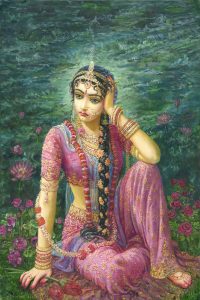 has entered someone’s heart, then humility will certainly be there. Where there is no humility, we can understand that there is no bhakti. He who has become a better devotee is he whose humility has increased. Where humility exists in its full form, there bhakti will also be in its full form. And where there is no humility, there will not be even a trace of bhakti. More humility is found in a madhyama-adhikārī devotee than in a kaniṣṭha-adhikārī, and more humility exists in the uttama-adhikārī devotee than in the madhyama-adhikārī. Then it is found more in the residents of Goloka Vraja than in the general class of uttama-adhikārīs, and amongst the Vrajavāsīs more humility can be seen in the gopīs, and amongst them the most humility is found in Śrīmatī Rādhikā. She is the pinnacle of humility. In whomever She detects even a trace of bhakti, She considers that person worthy of Her reverence. She offers prayers to that person, thinking, “I should try to become like them.”
has entered someone’s heart, then humility will certainly be there. Where there is no humility, we can understand that there is no bhakti. He who has become a better devotee is he whose humility has increased. Where humility exists in its full form, there bhakti will also be in its full form. And where there is no humility, there will not be even a trace of bhakti. More humility is found in a madhyama-adhikārī devotee than in a kaniṣṭha-adhikārī, and more humility exists in the uttama-adhikārī devotee than in the madhyama-adhikārī. Then it is found more in the residents of Goloka Vraja than in the general class of uttama-adhikārīs, and amongst the Vrajavāsīs more humility can be seen in the gopīs, and amongst them the most humility is found in Śrīmatī Rādhikā. She is the pinnacle of humility. In whomever She detects even a trace of bhakti, She considers that person worthy of Her reverence. She offers prayers to that person, thinking, “I should try to become like them.”
This is the vision of an uttama devotee: “Oh, Kaṁsa is so fortunate! In order to kill Kaṁsa, Bhagavān has come 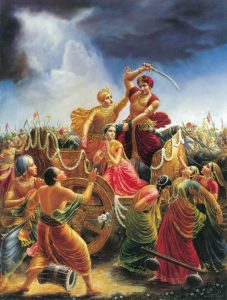 in such an attractive form! He won’t kill Kaṁsa’s soul, but will show him mercy by releasing him from his body. At the same time, He has bestowed on this world pastimes that are full of unlimited purifying potency. If not for Kaṁsa, then Kṛṣṇa would not have appeared, and His glories would not have become known. Only because of fear of Kaṁsa, Kṛṣṇa was taken to Gokula. Then He returned to Mathurā only to kill Kaṁsa, and then He left for Dvārakā because of Kaṁsa. Why? Jarāsandha’s daughters were married to Kaṁsa, so when Kaṁsa was killed, they went crying to their father, ‘For some reason Kṛṣṇa has killed your son-in-law!’ Taking an army, Jarāsandha attacked Kṛṣṇa seventeen times, so Kṛṣṇa thought, ‘Every day there is fighting here, so we should go away from here,’ and He left for Dvārakā. It was all because of Kaṁsa. Kaṁsa was not an ordinary person, and that is why a mahā-bhāgavata Vaiṣṇava like Nārada would regularly go to see him.”
in such an attractive form! He won’t kill Kaṁsa’s soul, but will show him mercy by releasing him from his body. At the same time, He has bestowed on this world pastimes that are full of unlimited purifying potency. If not for Kaṁsa, then Kṛṣṇa would not have appeared, and His glories would not have become known. Only because of fear of Kaṁsa, Kṛṣṇa was taken to Gokula. Then He returned to Mathurā only to kill Kaṁsa, and then He left for Dvārakā because of Kaṁsa. Why? Jarāsandha’s daughters were married to Kaṁsa, so when Kaṁsa was killed, they went crying to their father, ‘For some reason Kṛṣṇa has killed your son-in-law!’ Taking an army, Jarāsandha attacked Kṛṣṇa seventeen times, so Kṛṣṇa thought, ‘Every day there is fighting here, so we should go away from here,’ and He left for Dvārakā. It was all because of Kaṁsa. Kaṁsa was not an ordinary person, and that is why a mahā-bhāgavata Vaiṣṇava like Nārada would regularly go to see him.”
A madhyama-adhikārī may feel some hatred for Kaṁsa, but an uttama-adhikārī won’t. In a similar way, the gopīs are considering the Pulinda girl to be superior to themselves and are glorifying her: “If we could take birth as a Pulinda girl, then our mother, father and brothers would not restrict us from seeing Kṛṣṇa during the daytime. We could go to the forest every day and collect wood, but because we belong to higher-class families, this is not possible for us now.” If a sādhaka is to enter into bhakti, he must have this humility; and when he does, he can really be called a sādhaka.
In the verse we are discussing, why does it say śrī-kuṅkuma? It can mean that kuṅkuma which carries some 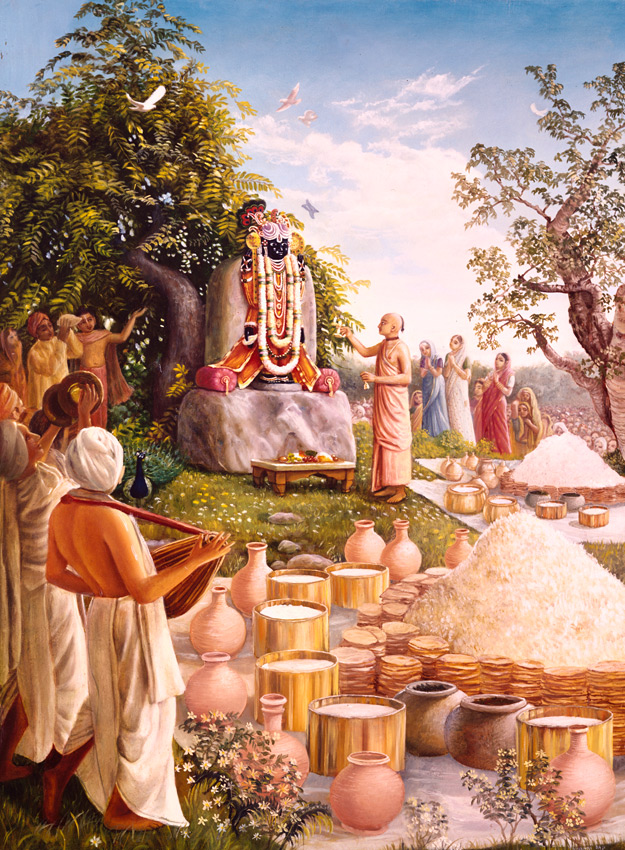 special splendour, or it can mean reddish, like Kṛṣṇa’s lotus feet. Kṛṣṇa is of a dark blue (śyāma) complexion, but the palms of His hands and the soles of His feet are a deep reddish colour. This kuṅkuma is of the same hue, and when it came in contact with Kṛṣṇa’s feet, it assumed some special splendour and also some special śakti. If food is prepared for and offered to Kṛṣṇa, His potency enters into it – Kṛṣṇa’s full śakti is in mahā-prasāda. Upon being touched by Kṛṣṇa’s mouth it becomes sac-cid-ānanda, just like Him. So before the gopīs used this kuṅkuma it was not śrī, but coming in contact with Kṛṣṇa’s lotus feet, all the potency and splendour of those lotus feet entered into it, and it became extraordinarily beautiful. And where did that kuṅkuma come from originally? Dayitā-stana-maṇḍitena – from Rādhikā, and therefore it can also be said that it became śrī from Her touch.
special splendour, or it can mean reddish, like Kṛṣṇa’s lotus feet. Kṛṣṇa is of a dark blue (śyāma) complexion, but the palms of His hands and the soles of His feet are a deep reddish colour. This kuṅkuma is of the same hue, and when it came in contact with Kṛṣṇa’s feet, it assumed some special splendour and also some special śakti. If food is prepared for and offered to Kṛṣṇa, His potency enters into it – Kṛṣṇa’s full śakti is in mahā-prasāda. Upon being touched by Kṛṣṇa’s mouth it becomes sac-cid-ānanda, just like Him. So before the gopīs used this kuṅkuma it was not śrī, but coming in contact with Kṛṣṇa’s lotus feet, all the potency and splendour of those lotus feet entered into it, and it became extraordinarily beautiful. And where did that kuṅkuma come from originally? Dayitā-stana-maṇḍitena – from Rādhikā, and therefore it can also be said that it became śrī from Her touch.
By seeing that kuṅkuma lying on the grass in the morning, smara-rujaḥ – lust arose in the heart of the Pulinda girl. But when she smeared that kuṅkuma on her body, did her lust increase or diminish? All the jīvas in Vṛndāvana – the insects, birds, animals and people – are always restless to see Kṛṣṇa; and when they see Him, does their eagerness for Him increase – or diminish? It certainly increases, but when they receive Kṛṣṇa’s touch, then they may become a little peaceful. Therefore this śrī-kuṅkuma is non-different from Kṛṣṇa Himself; upon seeing it, the eagerness of the Pulinda girl increased, but upon spreading it all over her body, she became fully satisfied, and once again peaceful.
In speaking this verse, the gopīs considered the Pulinda girl to be pūrṇāḥ – to have become completely fulfilled, even more so than the birds and animals of Vraja. She was not as divinely beautiful as the gopīs and was unqualified to participate in amorous pastimes with Kṛṣṇa, but in considering her to be more fortunate than themselves, the gopīs are exhibiting a symptom of mādana, which is the upper stage of mahābhāva. This is when they consider an unqualified person, or even an inanimate object, to be superior to themselves, and even give an explanation of why they feel this way. The flute is an inanimate object, but because it always resides at Kṛṣṇa’s lips and never becomes separated from Him, and even though it is of the male gender, the gopīs feel that it is more fortunate than them. Their sentiment towards the flute is that it is like the second wife of Kṛṣṇa.
So here, this feeling from the upper stage of mahābhāva has arisen in the gopīs towards the Pulinda girl. It is not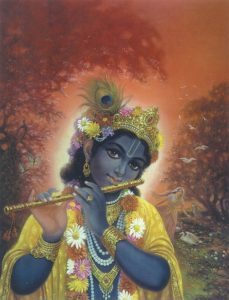 possible for other devotees to have this high sentiment, and therefore in places like Dvārakā this sentiment isn’t known. This beautiful bhāva is found only in Vraja. Even though this girl had no relationship with Kṛṣṇa, seeing how she began shivering and tears began flowing from her eyes when she noticed the kuṅkuma from Kṛṣṇa’s feet that was lying on the grass, the gopīs desired to experience her sentiments. Śrīmatī Rādhikā said, “Such a bhāva never comes to us!” Here Rādhikā Herself is singing the glories of the Pulinda girl, and She is not considering the actual elevated state of the vraja-gopīs. She is not thinking about that. Whose kuṅkuma was it in the first place? Hers, but she is considering the aborigine girl to be more fortunate! This is a symptom of mahābhāva. “She is so fortunate! If in My next life I could take birth as a girl of the Pulinda tribe, then there would be no one to prohibit Me from seeing Kṛṣṇa, and I would also be able to experience such a beautiful bhāva.”
possible for other devotees to have this high sentiment, and therefore in places like Dvārakā this sentiment isn’t known. This beautiful bhāva is found only in Vraja. Even though this girl had no relationship with Kṛṣṇa, seeing how she began shivering and tears began flowing from her eyes when she noticed the kuṅkuma from Kṛṣṇa’s feet that was lying on the grass, the gopīs desired to experience her sentiments. Śrīmatī Rādhikā said, “Such a bhāva never comes to us!” Here Rādhikā Herself is singing the glories of the Pulinda girl, and She is not considering the actual elevated state of the vraja-gopīs. She is not thinking about that. Whose kuṅkuma was it in the first place? Hers, but she is considering the aborigine girl to be more fortunate! This is a symptom of mahābhāva. “She is so fortunate! If in My next life I could take birth as a girl of the Pulinda tribe, then there would be no one to prohibit Me from seeing Kṛṣṇa, and I would also be able to experience such a beautiful bhāva.”
Image/Art made possible by Pixabay.com & Krishnapath.org







